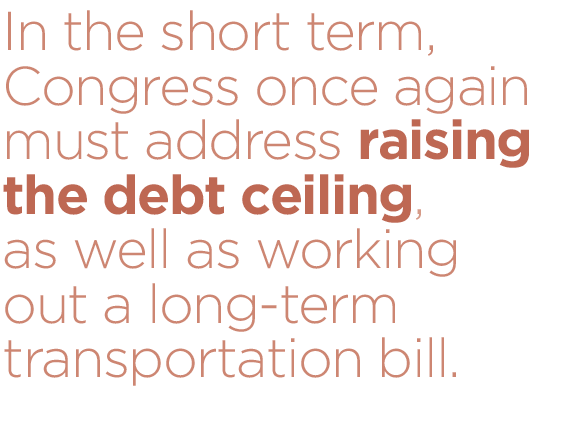October 1—the start of the U.S. government’s new fiscal year—is almost here, and Congress is nowhere near close to completing its work on the budget to continue funding the government. Is anyone else starting to feel like we are stuck in a political “Groundhog Day” that repeats itself each year?
It now seems like it’s common practice to fund the first few months of the new fiscal year via continuing resolution (or “CR” in Beltway lingo). That means Congress merely passes a bill calling for an extension of the prior year’s budget levels to buy more time for the appropriators to push through each federal agency’s individual spending bills. But this year may be even trickier, as politicians of both parties seem poised to use the hot-button issue of Planned Parenthood funding as political fodder to fuel their game of political chicken.
To add even more to the chaos, the presidential race already has heated up despite the general election being more than a year away. As the remaining Republican candidates continue their race to the right, the rhetoric grows, as does the bashing of current leaders. Soon, debating season for the Democratic hopefuls will get underway as perhaps more Dems enter the ring. That will leave most of the country—the majority of whom reside in the moderate middle—in limbo until primary season has come to a close.
While the political spectator in me relishes the drama, the rest of me is absolutely appalled. There are many critical issues not being adequately addressed that deeply impact our nation—and the commercial real estate industry. In the short term, Congress once again must address raising the debt ceiling, as well as working out a long-term transportation bill. In addition, lawmakers are still debating the nuclear deal with Iran, immigration and a number of other important issues.
 There also is a myriad of pending tax issues falling victim to a Congress that still claims to have broad tax reform on the agenda, but never seems to find the right time to explore it (as the country is always just a year or two from the next election). From the perspective of the commercial real estate industry, these tax issues have enormous significance. First, there is the issue of leasehold depreciation. Late last year, Congress passed a retroactive, one-year extension of the 15-year depreciation period for tenant improvements. As it was retroactive to January 1, 2014, it promptly expired once again just days later as 2014 ended. BOMA and our coalition partners have continuously tried to communicate to Congress that these short-term tax benefits cannot achieve the desired outcome of increased construction activity and job growth if they’re not enacted in such a way as to give the industry a longer planning horizon.
There also is a myriad of pending tax issues falling victim to a Congress that still claims to have broad tax reform on the agenda, but never seems to find the right time to explore it (as the country is always just a year or two from the next election). From the perspective of the commercial real estate industry, these tax issues have enormous significance. First, there is the issue of leasehold depreciation. Late last year, Congress passed a retroactive, one-year extension of the 15-year depreciation period for tenant improvements. As it was retroactive to January 1, 2014, it promptly expired once again just days later as 2014 ended. BOMA and our coalition partners have continuously tried to communicate to Congress that these short-term tax benefits cannot achieve the desired outcome of increased construction activity and job growth if they’re not enacted in such a way as to give the industry a longer planning horizon.
Recently, the House Committee on Ways and Means passed legislation to make the 15-year depreciation period permanent. While it passed along party lines, many Democrats support this issue and simply voted against the issue for political reasons and may reconsider if and when the legislation makes it to the House floor. However, it doesn’t appear likely that the Senate will follow this strategy, and they have already begun work on a short-term “extenders” bill (so named for Congress’ habit of extending a package of expiring provisions year after year). The best guess on this issue is that the extenders approach is the likely outcome.
Also very much under discussion once again is the issue of carried interest. President Obama and at least two leading Republican presidential hopefuls support ending this supposed “loophole” for hedge fund managers by increasing the tax on carried interest from the capital gains rate to the individual tax rate. That makes for a great sound bite, but the only problem is that its impact extends beyond hedge funds. According to The Real Estate Roundtable, 46 percent of all partnerships in America are real estate and the vast majority of them use a carried interest structure.
BOMA International’s advocacy team will continue to work with policymakers to advance our industry on legislative, regulatory and code development issues. Please don’t hesitate to contact us with questions or comments.

